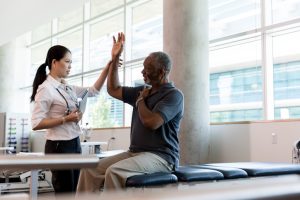Are you struggling with a shoulder injury or pain? The shoulder’s complex structure makes it particularly susceptible to various injuries, whether due to sports injuries, overuse, accidents, or the natural aging process. We understand the importance of specialized care and rehabilitation for shoulder injuries at Twin Boro Physical Therapy in Cape May Court House, NJ. Let’s explore common types of shoulder injuries, their causes, and at-home exercises and stretches that can help alleviate shoulder pain and prevent future injuries.
Common Types of Shoulder Injuries
- Rotator Cuff Injuries: The rotator cuff is a group of muscles and tendons that stabilize the shoulder. Injuries can range from mild strains to complete tears, often resulting from repetitive motion or sudden, forceful movements.
- Shoulder Impingement occurs when the shoulder blade (scapula) presses on the underlying soft tissues when the arm is lifted. It can lead to inflammation and pain, particularly when reaching overhead.
- Dislocations: The shoulder joint is the most frequently dislocated. A dislocation occurs when the upper arm bone (humerus) head is forced out of the shoulder socket.
- Frozen Shoulder (Adhesive Capsulitis): Characterized by stiffness and pain in the shoulder joint, frozen shoulder results from the tightening and thickening of the joint capsule.
- Tendonitis: Inflammation of the tendons in the shoulder, often due to overuse, can lead to tendonitis. This condition causes pain and tenderness outside the joint.
Common Causes of Shoulder Injuries
Shoulder injuries can result from a variety of causes, including:
- Overuse: Repetitive movements, especially those common in certain sports or occupations, can lead to overuse injuries.
- Trauma: Falls, direct blows, or sudden movements can cause acute shoulder injuries.
- Degeneration: Age-related wear and tear can deteriorate the shoulder joint and its supporting structures.
- Poor Posture: Chronic poor posture can contribute to shoulder pain and injury over time.
At-Home Exercises and Stretches
Implementing a routine of exercises and stretches can help alleviate shoulder pain and prevent future injuries. Here are a few at-home exercises you can try:
- Pendulum Stretch: Lean over slightly, allowing one arm to hang down. Swing the arm gently in small circles in one direction, then the other. This helps to reduce tension and increase mobility.
- Doorway Stretch: Stand in a doorway with your arms on the door frame, elbows at a 90-degree angle. Gently lean forward until you feel a stretch in the front of your shoulder. Hold for 15-30 seconds.
- Towel Stretch: Hold a towel behind your back with one hand and gently pull upward with the other hand. This stretches the rotator cuff muscles and improves flexibility. Switch arms and repeat.
- Arm Across-Chest Stretch: Bring one arm across your chest, using the other hand to press it towards your chest until you feel a stretch in the shoulder. Hold for 20-30 seconds and switch arms.
- Shoulder Blade Squeeze: Sit or stand with your arms at your sides. Squeeze your shoulder blades together as if trying to hold a pencil between them. Hold for 5-10 seconds and release. This strengthens the muscles around the shoulder blades, supporting shoulder stability.
Let’s Work Together!
Shoulder injuries require careful management to ensure a full recovery and prevent further damage. At Twin Boro Physical Therapy, we emphasize the importance of personalized care tailored to each patient’s needs. If you’re experiencing shoulder pain or recovering from an injury, consider consulting with a Twin Boro physical therapist in Cape May Court House, NJ, to develop a comprehensive rehabilitation plan. To get started, please request an appointment online or call 609.778.9450.
